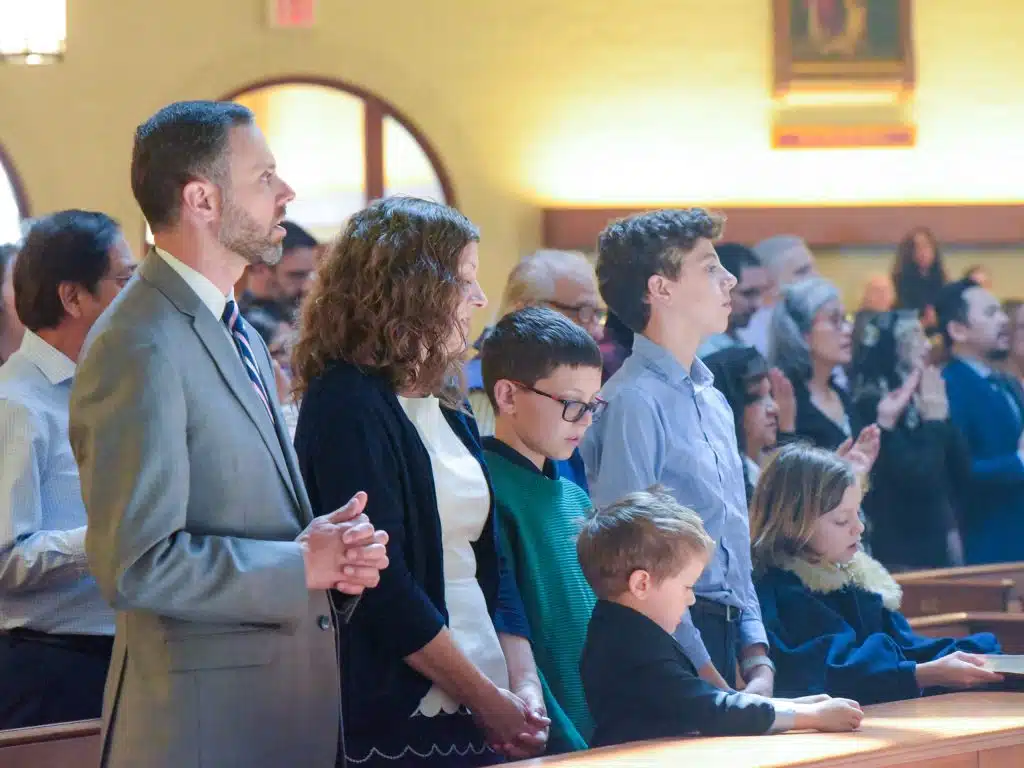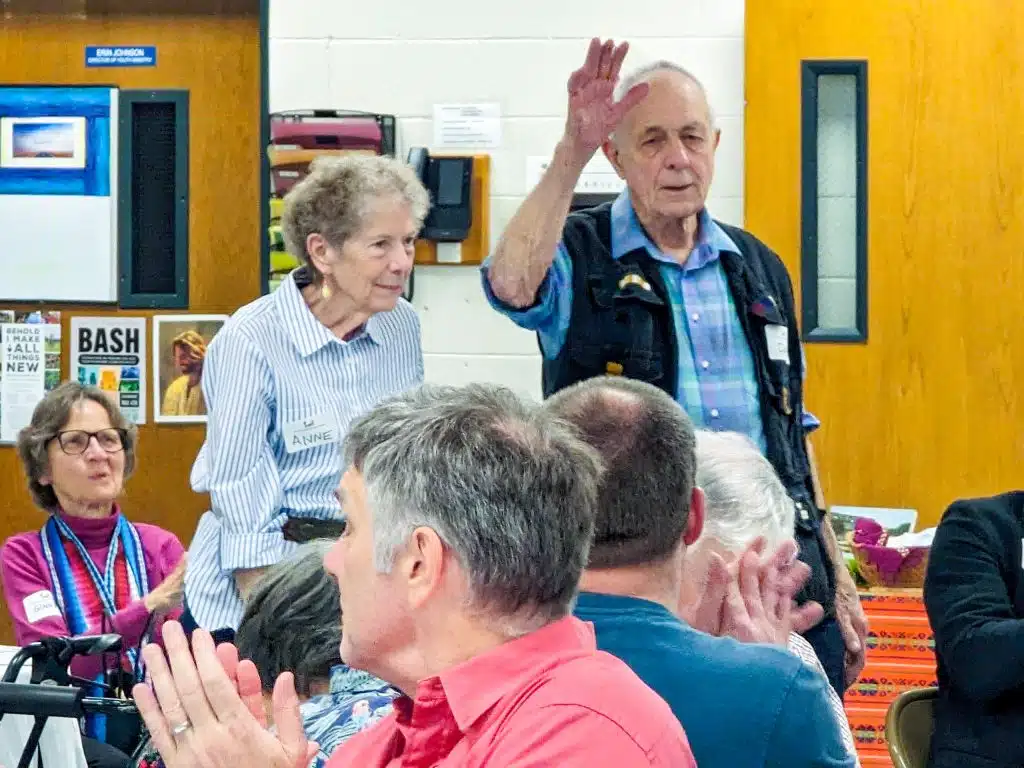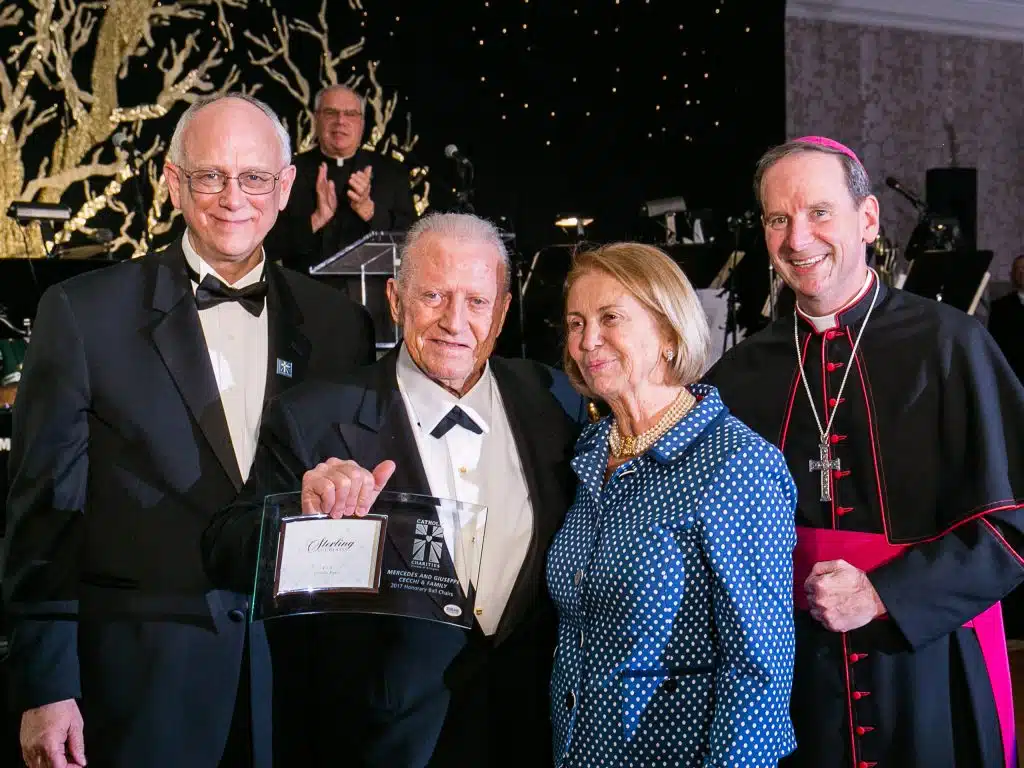Blanca and Cesar Marius needed a change. Running their successful business was tough, and their work quickly became their whole lives.
“It got to the point we were sleeping in the business – that’s how bad it was. I say bad but at the moment it seemed good, because we were going to get more money the next day,” said Cesar, a native Peruvian. “If you have to define workaholic – we invented workaholic. We were upside down before the eyes of God.”
That slowly began to change as Blanca got involved in church again. At first, Cesar would just drive her there. But gradually he became interested, too. He started to read Scripture, and its message resonated. “I said, ‘Blanca, we have to do something more,’ ” said Cesar.
In 2001, the couple sold their business, and a few years later they stopped working altogether. They took theology classes and now run the pre-Cana program for Hispanics in the Arlington Diocese.
Blanca and Cesar are one of many Hispanic couples who have adjusted to life in a new country, achieved economic stability and found God again through their Catholic roots.
A new book, Soul Mates: Religion, Sex, Love and Marriage among African Americans and Latinos by W. Bradford Wilcox and Nicholas H. Wolfinger, shows they are not alone.
“Despite facing severe economic headwinds, an enduring legacy of xenophobia, and perhaps the challenge of adapting to a new nation, most Latinos marry, enjoy happy relationships, and abide by a code of decency that increases the odds of enjoying a good family life,” it reads. “These triumphs are often facilitated by religious faith, which serves as an important source of personal, familial, and communal strength for many Latinos.”
“For the Latino community, faith is the most important thing in their lives,” said Father José E. Hoyos, director of the Spanish Apostolate for the Arlington Diocese. In his work, Father Hoyos sees the trust Latinos place in the church and the important role the sacraments play in their lives. He knows the high value they place on marriage and children.
Research confirms what Father Hoyos witnesses every day. Sixty-five percent of marriages between Hispanics make it to at least the 10-year mark, versus 61 percent for whites and 48 percent for blacks.
“Among blacks, whites and Latinos, Latinos enjoy the most stable marriages,” according to Soul Mates. “This is striking because Latinos have less income and education than do whites and yet do as well as their Anglo peers when it comes to intimate relationships. Thus, Latino familism somehow encourages marriage in the face of socioeconomic adversity.”
Father Hoyos believes the difficulties Hispanics face in life give them resilience in marriage. “They understand pain and poverty and when that happens, when you don’t have material things – they understand the only thing they have is each other. That’s where the richness comes in a spiritual way,” he said.
“From the Hispanic perspective, if we were in danger crossing the border, why can we not aguantar (endure, overcome) one more time? If we have difficulties (in marriage), then we need to aguantar,” said Father Hoyos.
American Influence
Luis and Lucretia Huitz were married in their native Guatemala before immigrating to the United States. A year after they were married, Lucretia gave birth to the first of their three children. American culture seemed at odds with their more traditional way of life.
“Back when I was in college (in Guatemala), (none) of my friends had living together in mind”- everyone got married before cohabiting, said Lucretia. No one postponed childbearing for very long, either, said Luis. The Huitzs have seen many Hispanic immigrants forget their upbringing for a time, falling into an Americanized lifestyle.
Soul Mates notes, “Latino immigrants, especially women, generally lead family-centered lives. But this is markedly less true for Latinos in subsequent generations. Nonmarital childbearing, single parenthood, divorce and cohabitation are higher among second- and third-generation Latino immigrants than among those of the first generation.”
Some Hispanics know the church’s teaching on life, contraception and sexuality, but choose not to follow it because “they think more of the mercy of God than the actual sin they’re committing,” said Blanca. But for many more, they are simply unaware.
The Mariuses have brought the message of Theology of the Body to some 750 couples in their nine years of ministry. Many of them, said Cesar, change their lives after hearing the truth. “We have an open-minded community willing to receive the word of God and do whatever it takes to make the change,” he said.
The couple believes that Arlington is the most organized diocese in terms of ministering to Latinos, but hopes even more theologically well-educated Hispanics will start to teach. “We need people who want to learn the new evangelization,” said Cesar. “We have over 600,000 people within the Hispanic community. Out of that, there are only three couples teaching natural family planning in Spanish. You can see how much work we have to do.”
Getting to the church on time
As their children were growing up, Luis and Lucretia became friends with another family at their parish of Holy Family Church in Dale City. They saw their friends at church every Sunday and watched as their children received their first holy Communion and confirmation with their own kids. Yet the parents had never been married in the church.
The Huitzes see this often as teachers in their parish convalidation program, a preparatory series of classes for couples who have been civilly married or are cohabitating without the sacrament of marriage. Typically, an understanding of the sanctity and seriousness of marriage combined with a fear of commitment stops them from walking down the church aisle.
Other times, couples feel like they can’t afford to get married, said Lucretia. They often come to this country to work, sending half the money they earn to their family overseas. Marriage gets pushed aside.
Still, they maintain a strong belief in God and a desire that their children become part of the church. The Huitzes said many couples enroll in the convalidation classes after being asked by their children why they don’t receive Communion.
Once, a couple who had been together for some 20 years came to the convalidation class, only to have the man drop out after the third meeting, said Luis. The woman continued coming every week, often crying during class. The next session they came back, but once again the man dropped out. The third time both of them came, stayed and were finally married in the church. “She never lost faith,” said Lucretia.
Likewise, when Luis initially approached the father of the family friend, the man told Luis that he wasn’t ready to be married. But this year, the couple entered the class and is to be married in the church in May.
“So I think God never leaves you alone,” said Lucretia. “He’s always inside you – you just need to listen, and I feel like the same thing is happening with all these couples.” Though many challenges arise, the Catholic faith that burns so brightly within the culture remains a light for Hispanic families even in their new homeland.
Di Mauro can be reached at [email protected] or on Twitter @zoeydimauro.


